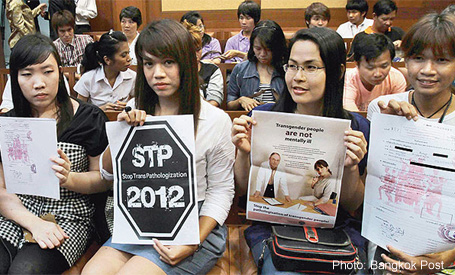(Photo caption from the Bangkok Post: Samart Micharoen, second from left, and his friends hold up campaign posters calling for an end to discrimination against transexuals at the Administrative Court yesterday.He petitioned the court against the Defence Ministry’s conscription records which described him as ‘‘psychotic’’ on the basis of his gender.)
After a longstanding effort by a group of katoeys to have the policy changed, the Thai military has now agreed to stop classifying katoeys and male-to-female transgender conscripts as having a "permanent mental disorder" and will instead use the term "gender identity disorder" by April next year, reported the Bangkok Post today.
Gender identity disorder (GID) is a formal diagnostic term used to describe people who experience significant gender dysphoria, discontent with their biological sex and the gender they were assigned at birth.
The Commissaire du Gouvernement, a judge attached to the Administrative Court, on Monday argued in a submission to the court against further use of the term "mental illness" for katoeys who had yet to undergo a sex reassignment surgery.
The Post reported on Wednesday that a group of katoeys led by Samart Micharoen filed a petition with the court against the 2005 military conscription records that clearly grouped Samart and other transvestites as people with a "permanent mental disorder".
More than having to bear the the insult, those who were exempted from military service for having a "permanent mental disorder" face difficulties getting a job, opening a bank account, or trying to get a visa to travel to a foreign country.
Currently and under the new changes, transgender people are exempt from military service that may last up to two years. Although many of the 100,000 places each year are filled by volunteers, the rest are drafted through a lottery that many hope to lose. As many as half million young Thai men face the military conscription lottery each year.
Earlier this year, the Post reported that the military had proposed to classify men being Type 1, 2 or 3. Type 1 refers to “men whose appearances are typical of men” while Type 2 refers to “men” who have undergone breast augmentation and Type 3 comprises those who had sex reassignment surgery.
"Normally only Type 1 are required to draw a conscription ballot," Thaksin Chiamthong, director of the academic resources division of the Army Reserve Command, was quoted as saying in the Post. "But if the number of Type 1 is insufficient, Type 2 will be conscripted as well, despite their female-like breasts."
The latest news report in the Post makes no mention of the Type 1, 2 and 3 classification system.
Ministry spokesman Thanathip Sawangsaeng said the ministry had sent a proposal to the Council of State, the government's legal arm, to change the term. If the change is approved, it will be submitted to the cabinet for a decision. "The ministry considers the issues of people's rights and freedom as important and treats individuals with respect," Col Thanathip said.

